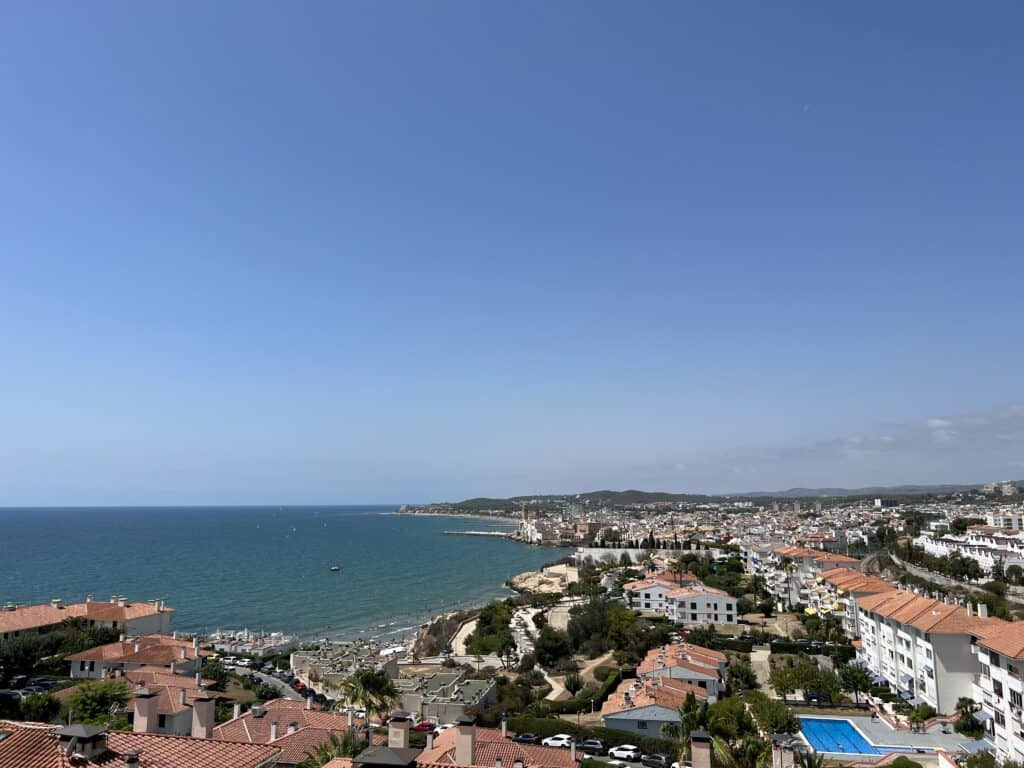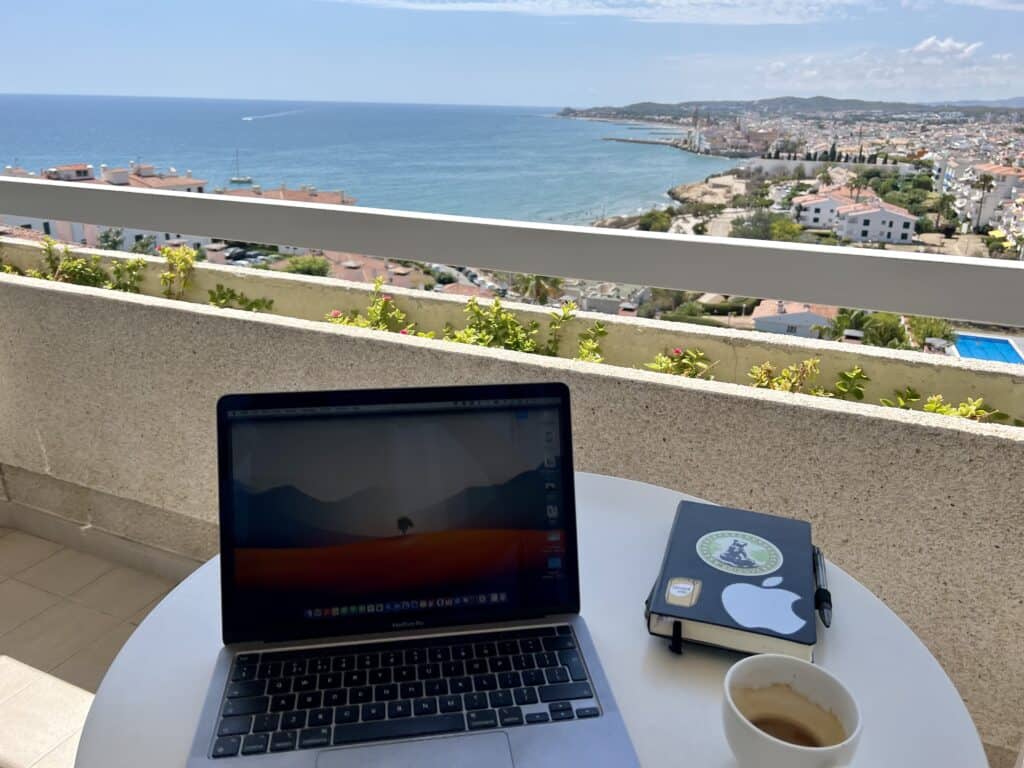I’m writing this from Barcelona Airport, at the tail end of a week-long personal retreat in Spain. While it’s fresh in my mind, I thought I’d share my reasons for taking this break, what I’d hoped to achieve and some thoughts on how regular retreats from our daily routines can contribute to our development.
But let me start by managing expectations: it absolutely doesn’t require you to leave the country and head for a destination on the coast. This is a tradition I’ve built for myself. It’s more about the principle of a break from the routine – and that could take any form and duration that works for you.
What is a personal retreat?
Let’s start with the basics. When discussing it with my coaching clients, I frame it as an intentional stepping back from the daily and weekly routine, to examine life from a more strategic perspective. Dropping the todo list and asking the bigger questions about work, life, relationships and the future.
And while the notion of a retreat has its roots in spiritual and religious practices, this needn’t be a part of it at all.
The idea is to break from what you normally do, seclude yourself, and take some time to reflect on what’s really important to you. This seclusion could be virtual (booking out some solitary time at the end of a month) or literal (actually going somewhere, away from the people in your life).
It’s the break from routine that’s important. There’s no point in replicating your working life, nor doing what you always do. Carving out special time to reflect means keeping it special.
What were my objectives?
I’ve been doing this for a few years now, and for me, there are multiple reasons I do it.
- To take a break from my immediate workload and responsibilities
- To step back from the day to day focus of task execution and projects
- To focus on my wellbeing – physical and psychological
- To intentionally reflect on the last 12 months
- To use this reflection to plan ahead for the next year
You might well be asking why August is the right time to reflect on the year gone by! Firstly, I tend to do very little work in August. Most of my UK and European clients are on holidays. So from a logistical point of view, it’s less disruptive.
It also represents the start of a new financial year for my business, and September has always felt like a time of fresh starts for me. I’m sure it’s something to do with the school calendar – ingrained since I was a child.
What did I do?

My retreat consisted of eight days in Sitges, Spain – just south of Barcelona. It’s a place I’ve visited many times before and I was confident I could achieve everything I wanted to there. This included:
- Daily walks in the sunshine, around the town, with a morning reflection session over coffee in a local bar. Another walk in the evening, followed by journaling before bed.
- I revisited my personal values and explored how I’d put them into practice over the last 12 months. I looked for opportunities to bring them to life more frequently in the future.
- I looked at how I’d been looking after my wellbeing over the last year. This was really helpfully supported by the plethora of data in Apple Health. It showed me everything from time spent on mindfulness, trends in my blood pressure, an overview of my cardiovascular health, movement trends, weight and exercise.
- I reviewed my working life in terms of satisfaction, direction, fulfilment and my values, and identified some small changes and new habits to positively impact all of these.
- I reviewed the performance of my business against the various targets I’d set this time last year, banked some wins and explored why some goals just hadn’t been achieved.
- I reviewed a shortlist of potential business initiatives and selected the ones I intend to act on in the coming months.
I wrote all of this up in my journal each day, so that I can revisit it in the coming weeks and ensure it gets put into practice.
What did I not do?
The whole point of investing in this retreat was to get away from my routines, so I didn’t do any project work, nor did I sit down with my email every morning.
Contrary to what you might imagine, I talked very little! I was there alone, so apart from pleasantries in restaurants and cafes, most of my conversation was with myself. This left more time for reflection and was a very welcome break from a job that sees me in discussions, coaching sessions or other meetings most of the day.
I didn’t work on this all day every day. Reflection can’t be rushed or somehow squeezed into an arbitrary timeframe. So I also spent some time enjoying the beach immediately below my hotel. I wasn’t going to go to Sitges and not dip my feet in the sea!
What did I get out of my personal retreat?

I’m returning to London this afternoon with a renewed and refreshed sense of purpose, some great ideas on changes I want to make to my business, my wellbeing and my personal way of life.
The reading I did was inspirational and interesting. The podcasts I listened to sparked connections and ideas for new projects. The opportunity to rest with no agenda was thoroughly relaxing and reminded me of the need to manage the pace of London life.
Most usefully, it gave me another perspective on how I can sustainably invest my time, attention and energy in the activities that are most important and meaningful to me.
How could anyone else do this?
If what I described interests you in any way, here are some suggestions for how you can craft your own personal retreat. And remember, there’s no need to book a week in the sun like I did!
- Carve out some dedicated time for your retreat. While there’s no rules here, I’d recommend a minimum of a few hours, if not an entire day. And more if you can afford to.
- In advance, compile an agenda of points you want to cover off. Don’t assume inspiration will strike when the time is right.
- Align it with something or somewhere you enjoy (e.g. a local park, by the sea, a favourite coffee shop etc.). If at all possible, get away from your workplace and home. Fresh locations can lead to fresh ideas.
- Build in some movement – research shows that walking can make an excellent contribution to problem-solving and idea generation.
- Take copious notes for future review – don’t rely on your memory, or assume that your ideas will automatically follow you home.
- Distill your plans and observations into an actionable form. That is, when writing your notes, identify the practical steps you can take from your reflections.
- Ask yourself plenty of open questions – the kind that can’t be answered with a simple ‘yes’ or ‘no’.
- Consider the role of your values, goals, habits. What matters to you, what targets you’re working towards and the daily manifestation of your behaviour. How are these contributing to the life you want to live?
- Be flexible – the real world has a nasty habit of intruding when we least want it to. So if you get interrupted or knocked off course, remember you can always come back to it later.
Over to you
If the idea of a personal retreat intrigues you, or is something you’ve tried before, I’d love to hear from you. What could a retreat look like for you? How can you make it a reality for yourself? Drop your questions and comments below.

